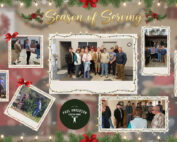Scriptural Basis:
“Keep yourselves in God’s love as you wait for the mercy of our Lord Jesus Christ to bring you to eternal life. Be merciful to those who doubt….. Jude 21-22
Application:
Doubters are common and complex. The practice and process of doubting the sensibleness of faith, believing in the God who is, is certainly difficult to critique with broad, indiscriminate strokes as though all doubters can be lumped into one bundle. Since I have not personally experienced severe doubt in my own life, that is, doubt in the foundational belief that there is a God who has revealed Himself in creation and in His Son, Jesus Christ, I am unwilling to presume an intimate understanding of the personalized struggle doubters experience, especially of those who have once “known faith and the message of the Gospel before doubting it. I know there are those who doubt out of sheer mental laziness; they simply shut their eyes to seeking answers to the challenges and difficulties of life. Blaise Pascal described such this way: “Being unable to cure death, wretchedness, and ignorance men have decided, in order to be happy, not to think about such things. Many others doubt because of the evil they experience or observe in our fallen world. Some doubt because they cannot see what faith postulates or on their own terms verifiably test its veracity to their satisfaction; the supernatural for them is beyond human reason, and therefore irrational or unbelievable.
C.S. Lewis wrote in one of his letters: “I think the trouble with me is lack of faith. I have no rational ground for going back on the arguments that convinced me of God’s existence; but the irrational deadweight of my old skeptical habits, and the spirit of this age, and the cares of the day, steal away all my lively feeling of the truth, and often when I pray I wonder if I am not posting letters to a non-existent address. Mind you I don’t think so—the whole of my reasonable mind is convinced: but I often feel so. However, there is nothing to do but peg away. One falls so often that it hardly seems worth while picking oneself up and going through the farce of starting over again as if you could ever hope to walk. Still, this seeming absurdity is the only sensible thing I do, so I must continue it. Lewis is expressing obedience to Jude’s admonition, “Be merciful to those who doubt, in writing to another and admitting his own not-to-uncommon struggle with feelings and his response of sheer faith. In grieving the untimely death of his wife, with whom he had a joyful and too short marriage, he wrote about its impact on his faith: “Bridge-players [you could substitute poker as the current rage] tell me that there must be some money on the game “or else some people won’t take it seriously. Apparently it’s like that. Your bid—for God or no God, for a good God or the Cosmic Sadist, for eternal life or non-entity—will not be serious if nothing much is staked on it. And you will never discover how serious it was until the stakes are raised horribly high; until you find that you are playing not for counters or for sixpences but for every penny you have in the world. The non-serious doubter is a fool. The one who doubts had better be “all-in in seeking answers or else his struggle is not credible. Too many are only playing games with themselves, with God, and thus with eternity.
I have recently been rereading Jacques Ellul’s The Judgment of Jonah . Jonah being delivered from the depths of the sea by a great fish is a biblical account that has been attributed to inciting doubt for some in the truth of God’s Word. Though I do not find agreement with Ellul in everything he projects, many brilliant points he makes are worthy of meditation; especially in those like me who do not think they are as impacted by doubt as others. He claims we miss the point in believing, as I do, or not believing in “the great fish rescue as though that is the supreme point in the history of Jonah. If we miss the message of Jonah’s story as our Savior’s chosen illustration of His own redemptive work for us on the cross; his truly dying and going down into hell to show his power over that terrible place, followed by His breaking the bonds of death in rising from the grave on our behalf; if we miss the primary message, then believing in the historicity of the great fish rescue is neither here nor there. Too often we claim not to doubt, yet somehow miss the application to our own sinful lives of the powerful truth the Lord wants us to see and experience; the message which is able to completely transform a person. There is always danger in “believing what is found in the Bible in terms of facts, the supernatural, the miracles, and the like, and yet not being personally “put to death by the Word; knowing the terrors of death and hell even as Jonah did going down into the deep, both experiencing and signifying death and hell itself; standing in utter awe of the Gospel, and being made new by it. There are many ways to express doubt, and thus every believer should daily assimilate David’s prayer as his or her own: “Search me, O God, and know my heart; test me and know my anxious thoughts. See if there is any offensive way in me, and lead me in the way everlasting. (Psalm 139: 23-24) As Lewis says we doubters need to go “all in.
Encouragement:
“Why was I made to hear your voice, and enter while there’s room, when thousands make a wretched choice, and rather starve than come?
(3rd verse of Isaac Watts hymn, “How Sweet and Awful is the Place, 1707)
Stay Updated
Sign up for our monthly newsletter and weekly devotional











